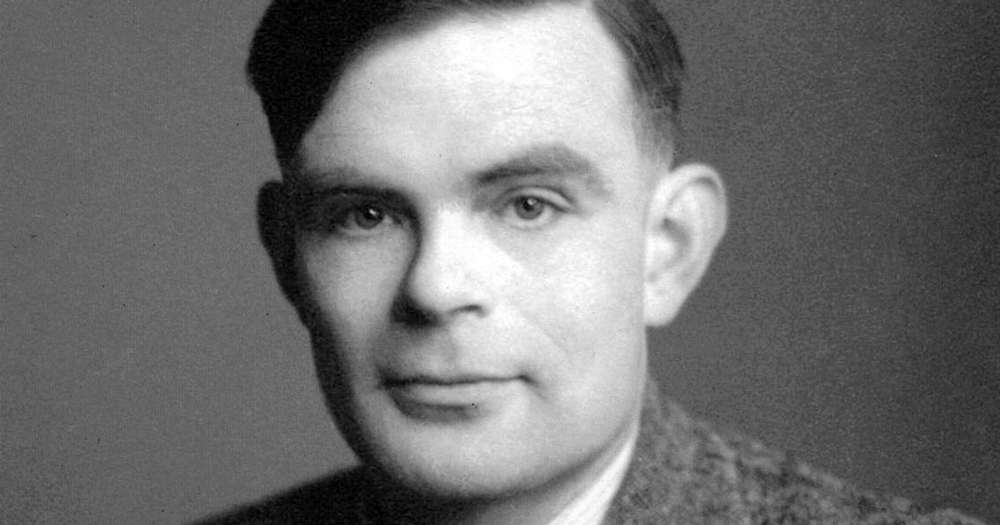LGBTQ+ folks belong in science, and we belong in history. Here, we were displaced from both.
November 8th to 15th was Science Week in Ireland, an annual celebration of our science and scientists. As part of Science Week, RTÉ showed a three-part series called Future Island, which shared “Ireland’s most exciting and inspirational stories and voices”, and celebrated “our nation’s experts and innovators.” Broadcast on RTÉ One across three consecutive nights, it featured live interviews and pre-recorded segments including one on Alan Turing. Most of it was quite good.
Alan Turing helped end World War II, and he was subsequently persecuted by his own government for being gay. Those are probably the first two things most people associate with one of history’s most important scientists.
The short segments that explored Alan Turing’s connection to Ireland was a two-minute piece that included details of his great grandparents’ land and his grandfather’s profession. We learned that his mother grew up in Borrisokane, County Tipperary and that this was the same town Martin Sheen’s mother came from. The segment celebrated that Turing helped crack the Enigma code and that he deserves “the gratitude of humanity” for having probably shortened World War II by two years and saved millions of lives.
They noted that he was one of the first people to ask if machines could think, and described his famous Turing Test for artificial intelligence. They explained that his algorithms were the basis for modern computing, that his work continues to influence our lives every day, and that Turing was “a real-life hero”.
This RTÉ segment did not, however, mention that Alan Turing was gay. Not once. It did not mention that he was arrested and chemically castrated for being gay. It did not mention how this likely led to his suicide at the young age of 41. This segment went out of its way to claim London-born Turing’s Irish connections, and it also went out of its way to erase his queerness. This erasure is not how you demonstrate “the gratitude of humanity” or how you honour “a real-life hero”.
A few days after Science Week, on November 18th, we celebrated the International Day of LGBTQ+ People in Science, Technology, Engineering, and Maths (STEM). This isn’t a corporate or academic event, it’s organised by an international community of LGBTQ+ folks. I’m one of the organisers, and we do it to celebrate the LGBTQ+ community’s contribution to science.
Turing is part of the LGBTQ+ community, and part of our history. This Science Week segment was an opportunity to honour him, to celebrate the LGBTQ+ community’s contributions to science. Instead, it erased him and, by extension, us. It sent the message that LGBTQ+ folks can be in science, but only if we hide our queerness.
Being queer in STEM is complex. I work in a field that has been—and continues to be—used to medicalise or ‘explain’ the very existence of me and my community. Biology, in particular, is regularly misrepresented and weaponised against the trans community. While science is an incredible way to explore life and the universe, it has (like everything else in this world) been shaped by transphobia, homophobia, and biphobia.
LGBTQ+ scientists are helping to address this—by questioning the ways we do science, challenging the biases in how we interpret science and expanding the ways that science is shared with people—and the best of this work is done in solidarity with other minoritised communities. However, LGBTQ+ folks don’t have the easiest route into STEM. 29% of us avoid studying STEM because we fear discrimination, and we’re more likely to drop out of STEM degrees.
Many of us do make it into STEM careers, but 40% of us are not ‘out’ at work, and 1 in 3 physicists have been urged by their colleagues to stay ‘in the closet’. Half of Trans physicists have been harassed at work, and 20% of trans scientists regularly consider leaving their job. The erasure of the identity of one of our most famous LGBTQ+ scientists, Alan Turing on RTÉ, during our biggest annual celebration of science, reflects and contributes to these problems.
LGBTQ+ folks belong in science, and we belong in history. Here, we were displaced from both.
References: Institution of Engineering and Technology, 2018; Hughes, 2018; Sansone & Carpenter, 2020; Yoder & Mattheis, 2016; American Physical Society, 2015; IOP, RAS, RSC, 2019
Dr Shaun O’Boyle is a science communicator, and one of the many organisers of LGBTQ+STEM Day.
© 2020 GCN (Gay Community News). All rights reserved.
Support GCN
GCN is a free, vital resource for Ireland’s LGBTQ+ community since 1988.
GCN is a trading name of National LGBT Federation CLG, a registered charity - Charity Number: 20034580.
GCN relies on the generous support of the community and allies to sustain the crucial work that we do. Producing GCN is costly, and, in an industry which has been hugely impacted by rising costs, we need your support to help sustain and grow this vital resource.
Supporting GCN for as little as €1.99 per month will help us continue our work as Ireland’s free, independent LGBTQ+ media.
